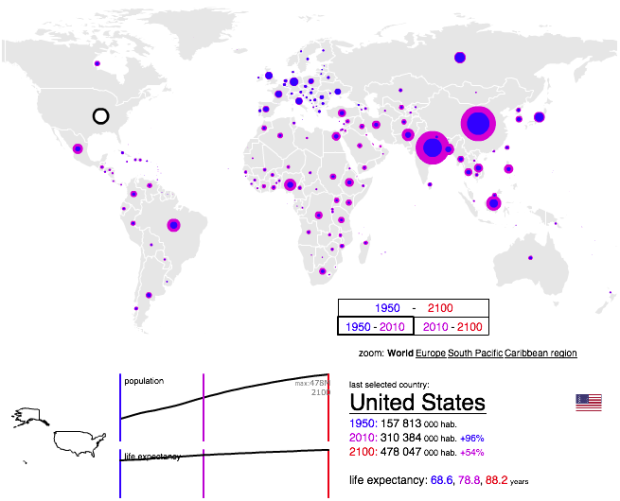According to estimates from the United Nations Population Division, there are now over seven billion people in the world. That’s enough people to fill, like, an entire room. Yeah. Visualization firm Bestiario, for The Guardian, shows this growth by country, using their home-brewed visual programming language, Impure.
There are a few options to play with. You can click on the bubble for a country to see the time series on the bottom for population from 1950 to 2010, through a projected 2100 population. Life expectancy for the same range is also shown. To compare geographically, you can also choose the year filters in the bottom right to compare, say, population in 1950 to that of 2010.
India and China of course pop out in that range, whereas many African populations are expected to increase a lot, percentage-wise, during the next century.


 Visualize This: The FlowingData Guide to Design, Visualization, and Statistics (2nd Edition)
Visualize This: The FlowingData Guide to Design, Visualization, and Statistics (2nd Edition)

Neat idea, but painfully ugly color selection that — gasp — reminds me of Excel.
On the topic of 7,000,000,000, Tim De Chant’s visualization of urban concentration is pretty interesting http://persquaremile.com/2011/01/18/if-the-worlds-population-lived-in-one-city/
The population is already out of hand. I just saw the Australian parents of the seven billionth child on television. They were ecstatic. Australians seem to want more people to populate their land. What they don’t seem to realize is that every child leaves a carbon footprint.
Freshwater is getting more scarce. Arable land, 10 to 20% of the planet’s land mass, is disappearing through erosion at the rate of tens of thousands of square miles per year. According to research at Oregon State University, the average American mother leaves a carbon footprint of 450 years per child. This is a disaster for climate change.
Organizations and individuals have been warning us about the dangers of overpopulation. A little over a year ago ScienceDaily noted that it was the major world problem– with climate change second. It is certainly recommended that people familiarize themselves with all of the problems of overpopulation. The free websites at overpopulation.org, which keeps us current on news of the problem, and the free e-book series “And Gulliver Returns” –In Search of Utopia– (http://andgulliverreturns.info) that not only goes into the details of the problem but also explains the ethical and psychological barriers to changing people’s behavior, are must reads.
Naturally business interests want more customers, political interests want more workers to support the welfare systems and more warriors to protect their ways of life, and religions need more souls to save. It is sad that we can’t see the cliff as we follow our lemming-like brothers into oblivion.
Malthus, alive and well.
And he was wrong how?
This is completely ridiculous. This view says much more about our generally pessimistic mood towards humanity rather than the so-called finiteness of resources. The world’s population reaching 7 billion on Monday is a reason to celebrate, not decry humanity. Yes, there are still problems of starvation and lower standards of living for many on the planet, but neither history nor mathematical logic bears out the conclusion that population pessimists reached – which, btw, only views humanity as consumers and not producers. Where there are these problems, we need to go about creating more for everyone, rather than curbing our numbers. In the Victorian times the world’s population was a small fraction of what it is now, yet there were still problems of poverty etc. What changed these problems and improved our lives in the West, was not going down from 1 billion to less, but by improving sanitation infrastructure, healthcare, breakthroughs in science and improving our general standards of living. There are many reasons to celebrate 7 billion on the planet. It proves how ingenious we are, that we’re better at keeping people alive more now than ever before, more brains to solve more problems and it is a private moment of happiness. As I read somewhere else, a mother of a child born yesterday in South Africa said “where there is life, there is hope”. That is absolutely the way we should see it, humanity is a solution not the problem. I came across a brilliant spoof recently that parodies the Malthusian outlook on humanity and its ridiculous assumptions, it is hilarious and brilliant! http://www.worldbytes.org/get-off-my-planet-happy-birthday-7-billion/
this makes the absurd assumption that everything will go on as in the past and it is making a 100 year projection.. the person who is making such a forecast should surely read mandelbrot and nicholas nassim taleb